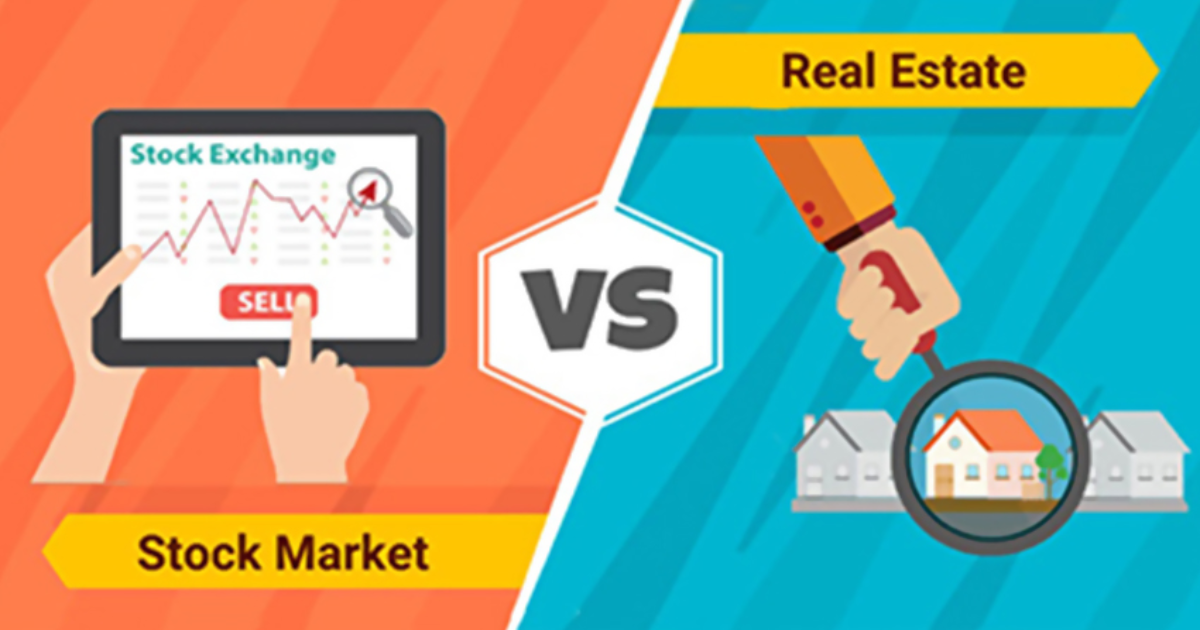Investing is one of the most effective ways to build wealth, but with so many options available, it can be difficult to know where to start. Two of the most popular investment choices are real estate and the stock market. Both offer the potential for significant returns, but they also come with their own sets of risks and rewards.
This article will compare real estate and the stock market in terms of risk, returns, liquidity, and other important factors to help you make an informed decision about where to invest.
Understanding Real Estate Investments
What is Real Estate Investing?

Real estate investing involves purchasing property—whether residential, commercial, or industrial—with the goal of earning a profit through rental income, appreciation, or both. Real estate can be a long-term, tangible asset that generates cash flow over time.
Types of Real Estate Investments
- Residential Properties: Single-family homes, apartments, or condos rented to tenants.
- Commercial Properties: Office buildings, retail spaces, or industrial complexes leased to businesses.
- Real Estate Investment Trusts (REITs): Publicly traded companies that own or finance real estate and distribute income to shareholders.
Pros of Real Estate Investing
- Tangible Asset: Real estate is a physical, tangible asset, which can provide a sense of security.
- Steady Cash Flow: Rental properties can provide regular income through monthly rents.
- Appreciation Potential: Properties often appreciate over time, increasing their value.
- Tax Advantages: Real estate investors may benefit from tax deductions, such as mortgage interest and property tax deductions.
Cons of Real Estate Investing
- High Initial Investment: Real estate requires a large upfront capital investment, including a down payment, closing costs, and potential property renovations.
- Illiquidity: Real estate is not as liquid as stocks. Selling property can take time, and it may take months or even years to recoup your investment.
- Property Management: Owning rental property requires ongoing maintenance and management, which can be time-consuming and costly.
- Market Risk: The real estate market is influenced by interest rates, location, and economic conditions. A downturn in the market can lead to lower property values or difficulty finding tenants.
Understanding Stock Market Investments
What is Stock Market Investing?

Stock market investing involves buying shares of publicly traded companies, such as stocks or bonds. Investors earn returns through stock price appreciation, dividends, or interest income. Unlike real estate, stocks are a form of financial asset and can be bought and sold quickly.
Types of Stock Market Investments
- Stocks: Ownership shares in companies that offer potential for long-term growth.
- Bonds: Debt securities issued by governments or corporations, typically providing fixed income.
- Exchange-Traded Funds (ETFs): Investment funds that pool money from many investors to buy stocks or bonds.
- Mutual Funds: Pooled investments managed by professionals, often spread across multiple stocks or bonds.
Pros of Stock Market Investing
- High Liquidity: Stocks can be bought or sold quickly, offering high liquidity.
- Lower Initial Investment: You can begin investing in the stock market with a relatively small amount of money.
- Potential for High Returns: Historically, the stock market has provided higher returns than other investment types over the long term.
- Diversification: You can diversify across various industries, companies, and asset classes, reducing risk.
Cons of Stock Market Investing
- Volatility: The stock market is subject to high volatility, with prices fluctuating significantly over short periods.
- Risk of Loss: Stocks can lose value rapidly, particularly in the event of an economic downturn or company failure.
- Emotional Stress: The market’s ups and downs can cause stress, especially if you’re new to investing or if your investment strategy isn’t clear.
- Fees: Depending on your investment approach, you may incur transaction fees, management fees, or advisory fees.
Comparing Real Estate and the Stock Market
1. Risk and Return Potential
Real Estate Risk
Real estate tends to be less volatile than stocks, especially in the short term. However, it is still subject to market fluctuations, local economic conditions, and interest rate changes. While real estate has the potential for steady appreciation and rental income, it can take years to see a significant return, particularly if property values remain stagnant or decrease.
Stock Market Risk
The stock market is generally more volatile than real estate, with stock prices frequently experiencing daily fluctuations. However, the stock market has historically provided higher long-term returns than real estate. Stocks also offer the potential for quick gains or losses, depending on market conditions.
2. Liquidity

Real Estate Liquidity
Real estate is much less liquid than stocks. Selling a property can take weeks, months, or even longer, especially in a down market. Additionally, selling a property often involves significant transaction costs (such as agent fees, taxes, and closing costs).
Stock Market Liquidity
Stocks are highly liquid. You can buy and sell stocks at any time during market hours, and the transaction costs are relatively low. This gives you the flexibility to adjust your portfolio as needed.
3. Initial Investment
Real Estate Initial Investment
The barrier to entry in real estate investing is typically higher than that of the stock market. You will usually need a large down payment (often 20% or more), plus additional costs for closing, repairs, and maintenance. This means that real estate is often an option for those with significant savings or access to financing.
Stock Market Initial Investment
Stock market investing typically requires less upfront capital. Many brokers allow you to start investing with as little as $100, and there are no major ongoing costs beyond brokerage fees and potential taxes. This makes the stock market a more accessible option for those with less capital.
4. Effort and Time
Real Estate Effort
Owning real estate, particularly rental properties, requires significant effort. Managing tenants, dealing with repairs, and handling property maintenance can be time-consuming. If you hire a property manager, you’ll incur additional fees. However, this can free up time, allowing you to focus on other investments or activities.
Stock Market Effort
Stock market investing can require less ongoing effort. If you choose individual stocks, you may need to monitor performance regularly. Alternatively, investing in ETFs or mutual funds reduces the need for active management. However, you will still need to evaluate the market periodically to ensure your portfolio remains balanced.
Also Read : How To Build A Budget You Can Actually Stick To
Conclusion: Where Should You Invest?
There is no one-size-fits-all answer to whether you should invest in real estate or the stock market—it depends on your financial goals, risk tolerance, and investment preferences.
- Real Estate: Best suited for those who want tangible assets, are comfortable with less liquidity, and have the time and resources to manage property. It offers steady cash flow and long-term appreciation potential but requires a higher initial investment and more ongoing effort.
- Stock Market: Ideal for those seeking liquidity, lower barriers to entry, and diversification. While it offers higher volatility, it can yield greater returns over time and requires less day-to-day management.
Many investors choose to diversify their portfolios by investing in both asset classes, balancing the stability and income-generating potential of real estate with the growth and liquidity of stocks. Ultimately, the right investment strategy depends on your personal financial situation, investment horizon, and level of involvement in managing your investments.
FAQs
1. Which is better for long-term wealth: real estate or the stock market?
Both have the potential for long-term wealth accumulation. Historically, stocks have offered higher returns, but real estate offers steady income through rental yields and long-term appreciation. It depends on your preferences and ability to manage investments.
2. How much money do I need to start investing in real estate?
The amount required depends on the type of property you plan to invest in. Generally, you’ll need at least 20% of the property’s value for a down payment, plus closing costs, repairs, and maintenance.
3. Can I lose all my money in the stock market?
Yes, investing in the stock market carries risks, and it’s possible to lose money, particularly if you invest in individual stocks or are not diversified. However, with a diversified portfolio and a long-term investment horizon, the stock market historically provides positive returns.
4. Can I invest in real estate without owning property?
Yes, through REITs (Real Estate Investment Trusts), you can invest in real estate without directly owning property. REITs allow you to earn a share of income generated by commercial properties or real estate portfolios.
5. How do I decide between investing in real estate or the stock market?
Consider factors such as your risk tolerance, the amount of capital you have, your investment timeline, and how much effort you’re willing to put into managing your investments. Real estate requires more involvement, while stocks are easier to manage but more volatile.








